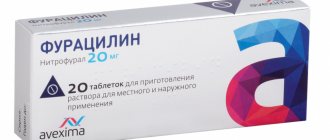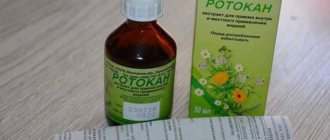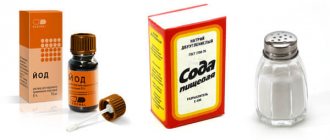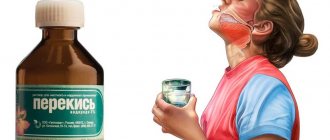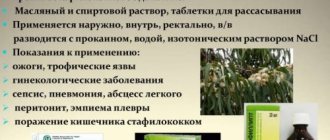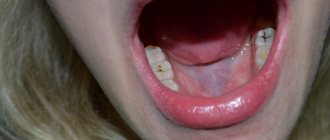12/21/2021
69 563
12 minutes
Co-author, editor and medical expert – Maksimov Alexander Alekseevich.
During seasonal epidemics, our body is susceptible to attack by many pathogens. Such diseases may be accompanied by a sore throat. Its common cause is tonsillitis - acute, predominantly bacterial inflammation of the tonsils or exacerbation of an existing infectious process. In the vast majority of cases, acute tonsillitis has a viral etiology. In second place in the number of causes of throat diseases are streptococci of various types. Viruses weaken the body's defenses by suppressing the ability of human immune cells to neutralize and absorb infectious agents. Damaged epithelial villi cannot cope with their function, creating conditions for mucus stagnation. The walls of the pharynx become swollen, hyperemic, and purulent films may form on their surface. The patient experiences pain when swallowing, cough, and general malaise.
An important component of complex treatment is gargling. This method allows you to mechanically clean the mucous membrane of microbial bodies, viruses, their waste products, pus, and moisturize the epithelium of the pharynx.
Depending on the composition of the rinse solution, an anti-inflammatory or antiseptic effect is realized and the intensity of pain is reduced. It is important to remember that rinsing alone may not be enough; more effective treatment includes a set of measures.
In this article we will look at the principles of local therapy.
Up to contents
Is it possible to gargle with salt?
Rinse is used for sore throat, runny nose, otitis, various pathologies of the ENT organs: acute and chronic tonsillitis, purulent processes in the tonsils, pharyngitis.
At certain concentrations, the salt solution has different therapeutic effects.
Hypertonic dilution of sodium chloride (osmotic pressure is greater than that in the tissues) relieves swelling, reducing sore throat, has antimicrobial activity, thins thick mucus, pus, and helps restore the draining function of the tonsils.
A saline solution with a salt concentration of 0.9% mechanically cleanses the walls of the pharynx from bacteria, viruses, dead cells, and moisturizes the mucous membrane of the oropharynx1.
To reduce the risk of infection, it is advisable to irrigate the nasal cavity and oropharynx after visiting crowded places or communicating with a sick person.
Up to contents
Rinsing teeth with soda: benefits and harms
A properly prepared solution has an antimicrobial effect and helps prevent the pathological process associated with the destruction of enamel, dentin, and pulp chamber. It relieves pain, reduces the severity of the inflammatory process, and can be used to whiten teeth. Its use as a prophylactic agent will help make tooth pain weaker and the patient’s condition much more comfortable.
In some cases, the soda-saline solution should be abandoned. For example, in cases of thyroid dysfunction, nephritis and tuberculosis, the use of iodine is contraindicated; this also applies to cases of lactation and pregnancy. More complete information about contraindications can be obtained by talking to a specialist.
It must be emphasized that soda and salt can be used in complex therapy only as a preventive measure. If the pain does not go away and throbbing pain is diagnosed, you should immediately visit a doctor. Specialists of the Alpha Dent clinic are ready to provide high-quality dental services and advise on the use of soda solutions. The right approach will allow you to achieve the desired effect and avoid complications.
How often should you gargle with salt?
Before taking independent measures to combat the infection, consult a specialist. Only a doctor can make the correct diagnosis and prescribe the right medications. Recovery depends on adherence to the regimen, the correct selection of medications and therapies.
You should gargle with a salt solution 3-4 times a day, for up to 5 days in a row (the duration of treatment in each case is determined individually). But since table salt is not a medicine, treatment with proven antiseptics is necessary (for example, Hexoral ® rinse solution or Hexoral ® spray, chlorhexidine, and others).
Many patients ask the question: “Which salt is best”?
We do not recommend non-scientific methods for treatment, as there is no evidence of their effectiveness. For gargling and irrigating the throat, there are specialized sprays with sea water, which are sold in pharmacies.
Up to contents
How to use the product correctly
Before rinsing, be sure to brush your teeth. The temperature of the liquid should not exceed 30 °C - ideally it should be slightly warmer than room temperature. Too high a temperature can cause a burn, and cold can increase the pain. You need to use only freshly prepared solution, otherwise it will lose some of its properties. The product should not be swallowed; it must be spat out at the end of the procedure.
“I take out salt and soda only in extreme cases, when someone in the family has an acute inflammation, for example, gumboil. But you can’t use them every day, that’s for sure! A regular pharmaceutical product like Listerine or Colgate is sufficient for daily use. I deliberately take a little less liquid, because if you do it according to the instructions, sometimes it makes your teeth cramp. And a bottle is enough for our family for 2 weeks..."
Ulyasha, from correspondence on the woman.ru forum
If the pain is too severe, it is better to extend the procedure to 5 minutes. In this case, the liquid will have to be renewed every half a minute. It is important to understand that rinsing will help dull severe symptoms, but not cure the disease. Immediately after the condition returns to normal, you should urgently go to the doctor.
Rinsing will help dull severe symptoms, but will not cure the disease.
Rinse your mouth with saline solution
Salt has a pronounced antiseptic effect. It accelerates the healing of wounds and small cuts on the mucous membrane, and also prevents the growth of pathogenic microflora. In combination with soda, it effectively reduces inflammation, reduces the intensity of purulent processes, and helps to slightly reduce pain. The product is recommended for use on gums, mainly in cases of acute inflammatory processes accompanied by the release of pus - periodontitis, periostitis, etc.
The effectiveness of soda solution
Baking soda also relieves inflammation, but also has an antifungal effect. Due to its abrasive properties, the powder perfectly cleanses the enamel of bacterial plaque and other contaminants, helping to restore its natural shine and whiteness. In addition, soda disinfects tissues, reduces swelling and soreness. It is only important to follow the recommended proportions, otherwise you can easily burn the mucous membrane.
Remedy with soda and salt against pain and inflammation
With the development of dental diseases of an infectious nature, accompanied by acute symptoms, a mixture of soda and salt, diluted in boiled water in equal proportions, helps well. The product relieves toothache and prevents the further spread of the pathological process. The composition can be used as an emergency aid or as part of maintenance therapy after consultation with a specialist.
Soda-salt composition with added iodine
If you add a few drops of iodine to salt and soda, you can significantly enhance the effect of the drug. Iodine actively fights pathogenic microflora and prevents the proliferation of pathogens. All three components in combination with each other provide a pronounced analgesic effect and help reduce bleeding and swelling of soft tissues. You just need to be careful with iodine - you need to strictly adhere to the dosage and take into account possible contraindications.
Iodine actively fights pathogenic microflora
Salt solution for gargling - proportions
As a rule, adults are recommended to use 1 teaspoon of salt per 200 ml of boiled water. If there are no contraindications, take iodized salt.
In order not to harm your health, it is better to use medications with proven effects. A salt concentration of more than 10% can damage the mucous membrane of the throat, and undissolved crystals can cause soreness and soreness in the throat, scratching the epithelium and delaying recovery.
We recommend certified pharmacy products for treatment, as they have undergone clinical trials and are safe and effective medicines.
Up to contents
What salt should you use for rinsing?
The simplest salt is suitable for the procedure, which is stored in a cabinet in any kitchen. To rinse with salt for gum inflammation and toothache, you can use table, sea or iodized salt. But you need to give up powder with flavorings and bath salts. Dyes and other chemical components have an adverse effect on the mucous membrane.
By the way, if toothache or inflammation of the gums caught you on vacation at sea, you should not look for the nearest manufactured goods in southern countries. Simply rinse your mouth with sea water containing healing salt. The main thing is to collect water not near the shore, but away from the swimming area, in an area where it does not stagnate.
How to rinse your mouth correctly?
For the saline solution to work effectively, it is important to rinse your mouth correctly:
- Make sure the rinse solution is warm, but not hot or cold. In no case should you burn the already inflamed mucous membrane, and cold water, on the contrary, will increase the pain. By the way, if cold water helps relieve toothache, this indicates purulent inflammation of the nerve.
- Before rinsing, brush your teeth thoroughly: it is important to remove all food particles.
- The rinsing procedure should last at least 5 minutes, but the solution should be changed every 30 seconds.
- When rinsing with salt for a toothache, you should tilt the solution more towards the diseased tooth.
- You should rinse your mouth as often as possible, preferably once an hour.
- After rinsing, no matter how hard it is, you should not rinse your mouth with clean water. Try to be patient for at least 5 minutes.
Recipes for saline solutions and their uses
Here are the most effective recipes used for gum inflammation and toothache.
Simple saline solution
How to cook:
Take a glass of warm water (temperature about 30 °C), add 2 teaspoons of salt and stir well.
How to use
: Rinse your mouth according to the diagram below.
Salt and soda
Rinsing with soda and salt is effective for both gum inflammation and toothache. The mixture is also suitable for patients with acute reactions to salty foods. The tandem of salt and soda will be effective both in the presence of tartar and periodontitis.
How to cook:
Mix 1 teaspoon of baking soda and 1 teaspoon of salt in a glass of warm water.
How to use:
Rinse after brushing your teeth using the above method. Also, some dentists recommend using the solution after tooth extraction. In this case, you need to rinse your mouth very carefully so as not to injure the formed hole.
Salt + soda + iodine
You can add 2-3 drops of iodine to the solutions described above - it will enhance their disinfectant effect.
How to cook:
Mix 1 teaspoon of salt, 1 teaspoon of soda and 2-3 drops of iodine in a glass of water. The latter will enhance the disinfecting properties of the mixture.
How to use:
Rinse according to the indicated method every 2 hours.
Sea salt
How to cook:
For a glass of warm water, take 1 level teaspoon of sea salt.
How to use:
Rinse your mouth once an hour according to the above scheme. By the way, sea saline solution can be used not only for toothache and gum inflammation, but also as a preventive measure for various dental diseases. In addition, sea salt will give your teeth whiteness and strengthen the enamel.
Some people also use salt as toothpaste, first grinding it to a powdery state.
Salt + vodka
How to cook:
In a glass of warm water you need to add 2-3 tablespoons of vodka and 1 teaspoon of salt.
How to use:
It is worth using the vodka solution very carefully so as not to burn the oral mucosa. Rinsing is acceptable 2-3 times a day.
Salt with herbs
Saline solutions, if desired and necessary, can be supplemented with herbal decoctions. Simply put, the warm water in the glass should be replaced with a healing decoction. Which one? Choose the most pleasant and useful herbs for your situation.
- Chamomile and sage
. To prepare the solution, mix 1 part chamomile, 3 parts mullein and 2 parts sage and pour boiling water over the mixture. The mixture should sit to room temperature. Then you need to add 2 teaspoons of salt and rinse the tooth. - Oak bark.
1 tablespoon of oak bark should be poured with boiling water and kept in a water bath for 20 minutes, and then, after removing from the heat, leave for 40 minutes. The resulting cooled broth is decorated with 2 tablespoons of salt, then the crystals are stirred and used for rinsing. - Seed and strawberry
. For this decoction you should take 1 part of string, raspberry leaves, strawberries, and 2 parts of mint. Pour boiling water over the mixture of herbs and let it brew to room temperature, then strain and add 1 teaspoon of salt. You should rinse the tooth with the solution 9-10 times a day. - Plantain, chamomile and rose petals.
This aromatic mixture should be poured with boiling water and allowed to brew, then add salt and rinse the tooth. The solution will relieve pain, soothe and disinfect the oral cavity.
Herbal infusions are one of the most effective salt supplements. However, in order to prepare the right decoctions, you should follow several rules:
- Prepare the decoction only in enamel or glass containers.
- Adjust the heat to low.
- Use the cooled liquid immediately.
Does salt help gums?
Saline solutions are an excellent remedy not only for strengthening and whitening teeth, but also for sensitive and bleeding gums. Table, sea, and iodized salt are also suitable for preparing salt potions. Use rinses daily, 2 times a day, and within a week you will notice that your gums have become healthier.
However, you also need to rinse your gums with salt correctly:
- Brush your teeth thoroughly with the paste.
- Then remove any remaining food from the interdental spaces using dental floss.
- Rinse your mouth for 30 seconds and repeat the procedure several times.
Salt rinses for gum inflammation
If, while brushing your teeth, you begin to notice blood on the brush, this clearly signals inflammation of the gums and requires an early visit to the dentist.
Salt rinses for gum inflammation can be an excellent aid. Together with herbal decoctions, this white powder can relieve pain, inflammation and swelling of tissues and significantly simplify the patient’s life.
Here are the most popular recipes for salt compositions used for gum inflammation, in addition to the standard ones given earlier:
- Banana paste
. To prepare, several banana skins should be ground into powder. Add 1-2 tablespoons of olive oil and 2-3 tablespoons of pre-crushed sea salt to the resulting composition. You can lubricate the affected areas with the paste, in a couple of days the gums will become strong and healthy - Thyme, oak bark, sage, chamomile
can also be mixed with table salt and soda. You should rinse your mouth with the resulting mixture 1-2 times a day.
Is it possible to rinse your gums with baking soda, without salt?
Of course you can. Baking soda is found in almost every kitchen, as is salt. But, unlike salt, soda only cleans, disinfects and deodorizes teeth and gums without causing unnecessary irritation.
To prepare a soda solution:
- Mix 1 teaspoon of baking soda with a little water. The mixture should become similar in consistency to toothpaste.
- Apply the mixture to your teeth and gums and thoroughly brush your teeth with it in the usual way (with a brush).
- After washing off the composition, you will be surprised at how clean and polished your teeth become, how fresh your breath becomes, and how the soda managed to neutralize the increased acidity of the oral cavity.
Rinsing gums with baking soda
A very simple and at the same time useful procedure is rinsing the gums with soda. After all, baking soda is found in almost every kitchen. To rinse your gums, dilute one teaspoon of baking soda in a glass of boiled and cooled water. A solution of soda can be used for gum inflammation.
When should you not rinse your gums with salt?
You should not rinse your teeth and gums with salt if you suffer from severe tissue inflammation. In such cases, the solution can only worsen the situation. If you are experiencing unbearable pain and suspect serious tissue inflammation, replace the saline solution with one of the following:
- Aloe juice will perfectly eliminate inflammation. To rinse, you need to take freshly squeezed juice and dilute it in half a glass of water. You need to rinse your mouth three times a day.
- Golden mustache also perfectly strengthens sore gums. To prepare the solution, you need to grind a leaf of the plant, and then pour a glass of boiling water over it. The mixture should sit for 30 minutes and rinse your mouth after brushing your teeth every morning.
- Sage is one of the most effective remedies for bleeding gums, which prevents the spread of inflammation. To prepare the solution, you need to infuse 1 tablespoon of sage in 300 ml of boiled water. The composition can be used for rinsing, compresses, and oral baths.
- Oak bark perfectly relieves inflammation of the oral mucosa. To prepare the solution, boil 2 tablespoons of oak bark in half a liter of water, then let the mixture brew and use for rinsing.
- Chamomile flowers are an excellent remedy for gingivitis. To prepare the solution, you need to infuse one spoon of flowers for half an hour, and then cool the solution. The mouth should be rinsed systematically until complete healing.
Instead of a solution of salt and soda, you can also use essential oils to treat gum inflammation. The most popular are:
- Black cumin oil. Perfectly disinfects, relieves pain, eliminates bleeding. It is recommended to rub 1-2 drops of oil into the surface of the gums or make oral baths.
- Tea tree oil is an excellent natural antiseptic that eliminates pathogenic bacteria and relieves bleeding and discomfort. To prepare the solution, you need to dilute 2-3 drops of oil in a glass of water and rinse your gums after each meal.
- Sea buckthorn oil quickly heals inflamed tissues and relieves pain. The oil can be used for mouth baths, applications, rubbing, or simply hold a tablespoon of oil in your mouth for 2-3 minutes.
An effective and, most importantly, safe alternative to natural remedies is Asepta Active mouth rinse, used for gingivitis, periodontitis, stomatitis and toothache. The product has a pronounced antibacterial effect, prevents inflammation and bleeding of the gums, prevents the formation of plaque and freshens breath.
How to gargle with salt correctly?
We recommend using only certified solutions that are medicinal, such as Hexoral ®, chlorhexidine, and other antiseptics.
To treat a sore throat safely and effectively, you need to follow some rinsing rules:
- The procedure is carried out after eating.
- Any rinse solution must be fresh every time.
- The patient takes a sip into his mouth and rinses his tonsils for 10 seconds. The duration of the procedure is 3-5 minutes. Such approaches are required 4-5 daily.
- You should tilt your head back for more effective treatment of the tonsils.
- Try to avoid swallowing the product.
- Rinsing as a method of treatment is contraindicated for children under 3 years of age, since due to their age, they will not perform the required actions and may choke or drink the solution.
- You should not drink or eat for an hour after completing the procedure.
Many sources recommend rinsing with salt and soda, iodine, etc. You should not do this for safety reasons, as you can get a burn to the soft tissue of the throat.
Currently, more effective drugs are available for the treatment of tonsillitis, one of which is Hexoral ® rinse solution, as well as other agents for local therapy. When using medications, the likelihood of recovery increases.
Up to contents
Indications for rinsing with a solution of soda and salt
As a preventive procedure, it is recommended to rinse with sodium bicarbonate, as this has the necessary antimicrobial effect. The main indications for rinsing with soda and salt in the required proportions:
- Dental diseases. Gingivitis, stomatitis, periodontal disease and other pathologies in which the gum canal is damaged.
- Hygienic. Aimed at removing food debris and plaque from hard-to-reach areas.
- Therapeutic and prophylactic. Rinsing your mouth with soda can also be done as a preventative measure.
All therapeutic rinses must be performed only after consultation with a doctor. Only a dentist can determine whether in your case it is possible to rinse your mouth with soda, salt and iodine. This procedure has certain contraindications, so improper use can lead to deterioration of health and significant harmful effects.
Rinse during pregnancy
The expectant mother's body is quite vulnerable to various types of infections. Some immunosuppression occurs to ensure that the fetus has the opportunity to develop normally in the mother's body. However, recently there has been evidence that during the gravidar period, some parts of the immune system, on the contrary, are strengthened. There is an “Immunological paradox” of pregnancy. In response to the action of endotoxins from various bacteria, a woman’s body releases a large number of pro-inflammatory cytokines (a class of substances involved in the implementation of the most important physiological reactions of the body).
Based on this, we can conclude that the specific immune response is suppressed, and the nonspecific, on the contrary, is enhanced.
If you feel a sore throat, you should immediately seek medical help. The doctor will be able to choose effective, and most importantly safe, treatment.
Gargling during pregnancy will not harm2. The liquid promotes mechanical cleansing of the tonsils from dead cells, bacteria, and pus. But remember that rinsing is only part of the therapy. Comprehensive and complete treatment should be prescribed by a doctor, because the expectant mother must take care not only of her health, but also of the condition of her child.
Note!
If the condition remains unchanged during the day or the sore throat intensifies, you should consult a specialist.
Up to contents
How to prepare a universal soda-salt solution
To prepare the medicinal composition, you need to take a glass of boiled warm water - approximately 27-30 °C, and dilute a teaspoon of soda and salt in it. It is important to stir the bulk ingredients until completely dissolved. After this, you need to rinse your mouth thoroughly for 1-2 minutes, paying special attention to the sore area. By the way, the ingredients are good on their own. So, to relieve acute pain and symptoms of inflammation, you can rinse your mouth with only salt or only soda. In some cases, it is possible to add a few drops of iodine to enhance the effect.
Gargling with salt for children
We recommend only special pharmaceutical rinsing solutions and seawater sprays for use by children, as their effectiveness and safety have been confirmed by clinical trials.
First you need to make sure that the child has the necessary skill. The procedure is allowed for children aged 4-5 years. For small children, rinsing is not suitable, since the risk of swallowing the solution cannot be excluded; the child may choke or attempts will be ineffective.
It is important to follow the rinsing rules so as not to harm the baby.
- Rinse should be done after eating.
- Irrigation of the pharynx should be systemic, over several days (the dose of the drug, the duration of treatment should be determined by the doctor)
- If possible, swallowing the medication should be avoided.
- It is important to follow the correct technique (with the head thrown back to clear the throat more thoroughly)
- After completing the procedure, do not eat or drink for one hour.
Solutions prepared independently at home may be ineffective or harmful. Salt crystals that are not dissolved in water can damage the epithelium and increase pain.
This is useful to know
: Often in children the clinical picture of the disease differs from that in an adult.
Due to the peculiarities of the anatomical structure of the pharynx, tonsillitis and laryngitis in young children can be complicated by acute stenosis of the larynx.
And in this case, you can’t hesitate. The glottis narrows and breathing is sharply limited, sometimes this develops at lightning speed and requires emergency medical attention4. Up to contents
What are the benefits of soda-salt solution for mouth rinsing?
The product is widely used for rinsing during the treatment of diseases of the teeth and gums: caries, gingivitis, periodontitis and periodontal disease. The solution helps out in cases where acute symptoms arise suddenly and you need to alleviate the condition before visiting the dentist. The soda-salt composition perfectly relieves inflammation and redness of the mucous membrane, disinfects, has a calming effect and helps to slightly reduce pain.
Sodium bicarbonate or simply soda is a product that is used to clean dirty surfaces, for example, in the kitchen. But a solution with its addition also helps in the treatment of many dental diseases. In combination with salt and sometimes with iodine, soda gives a pronounced antibacterial effect, strengthens hard and soft tissues, and prevents the further spread of the pathological process. Thus, the effect of the composition can be formulated in several main theses:
- has an antibacterial effect,
- helps stop the pathological process and prevents further destruction of the enamel,
- stops inflammatory processes in the mucous membrane,
- helps to significantly reduce pain and alleviate the condition,
- removes bacterial plaque and tartar.
Soda-saline solution helps in the treatment of many dental diseases.
Soda-saline solution is not suitable for daily use. It is recommended in cases where there are clear signs of pathological processes in the oral cavity. The composition can be used for emergency relief of acute symptoms, and as a maintenance agent - only after agreement with the attending physician.
Gargling with salt for a sore throat
Its purpose is to mechanically clean the pharynx and tonsils of pathogenic microorganisms, pus, dead epithelial cells and mucus. Salt rinsing is most effective for bacterial forms of sore throat. It must be remembered that treatment with home remedies alone may not be enough. You should not delay visiting a doctor, as it is important to correctly determine the diagnosis and begin complex therapy.
Even with regular gargling with salt, it is not possible to eliminate all pathogenic microorganisms. To eradicate (completely destroy) pathogenic microbes, one should resort to drugs that act on the cause of the disease and break the chain of disease development, i.e. medications that can destroy infectious agents - antiseptic, antibacterial, antifungal, and others5.
Up to contents
What are the pros and cons?
The main advantages are the availability of ingredients, ease of preparation, effectiveness and safety. Among the key advantages, experts highlight the following points:
- quickly relieves pain and inflammation,
- removes plaque and cleanses enamel, freshens breath,
- stimulates the healing of microtraumas and wounds on the mucous membrane,
- inhibits the formation of dental plaque,
- strengthens hard and soft tissues - the composition is useful for both teeth and gums,
- Easy to prepare from simple and affordable ingredients - a good budget option.
The disadvantages include unpleasant sensations due to enamel hyperesthesia, as well as a specific taste, which in rare cases causes attacks of nausea. In addition, the composition only relieves symptoms, but does not treat the disease itself, so its use is good before or after visiting a doctor, and then only as maintenance therapy.
- Borovsky E.V. Therapeutic dentistry, 2006.
Why is regular salt replaced with sea salt?
Some dentists advise taking baths and rinsing sore teeth with a solution of baking soda and sea salt. The fact is that this product contains an increased amount of iodine, which has an antimicrobial effect. In addition, this salt helps strengthen tooth enamel.
To prepare a healing solution for tooth pain, you need to take 1 tsp. soda and sea salt and dilute them with 250 ml of warm water. To strengthen the enamel of teeth, it is enough to rinse sensitive teeth with a mixture containing 1 small spoon of bulk product and half a glass of water.
To weaken the effect of pathogenic microbes living in the oral cavity and remove heavy odor, you can rinse your mouth with a solution of soda and hydrogen peroxide. To make the medicine, take 250 ml of heated water and add 3 tbsp. l. 3% peroxide and 1 tbsp. l. sodium bicarbonate without a slide. The mixture is thoroughly stirred and used for therapeutic rinsing of the mouth. It is not recommended to take the drug internally or use it for any other therapeutic purposes.
Despite the beneficial properties of salt, iodine and soda, medicinal mixtures based on them can only be used as first aid or auxiliary treatment. If acute pain or inflammation occurs, you should contact your dentist as soon as possible and begin therapy aimed at eliminating the cause of the disease.
Baking soda rinse
Baking soda is known for its antifungal effect. A solution with soda gently cleanses the oral cavity and tooth enamel, blocks the development of pathogenic microbes, disinfects the oral cavity, and reduces swelling. In order for teeth rinsing to solve existing dental problems, you must follow the recommendations above and maintain the proportions. Water for rinsing your mouth must be boiled. Use 1 tsp per glass of water. soda The contents of the container must be mixed well, the liquid should be cloudy, whitish, sediment at the bottom is unacceptable. If you are worried about acute toothache, then it is permissible to double the amount of soda.
Soda solution is an excellent oral disinfectant.
